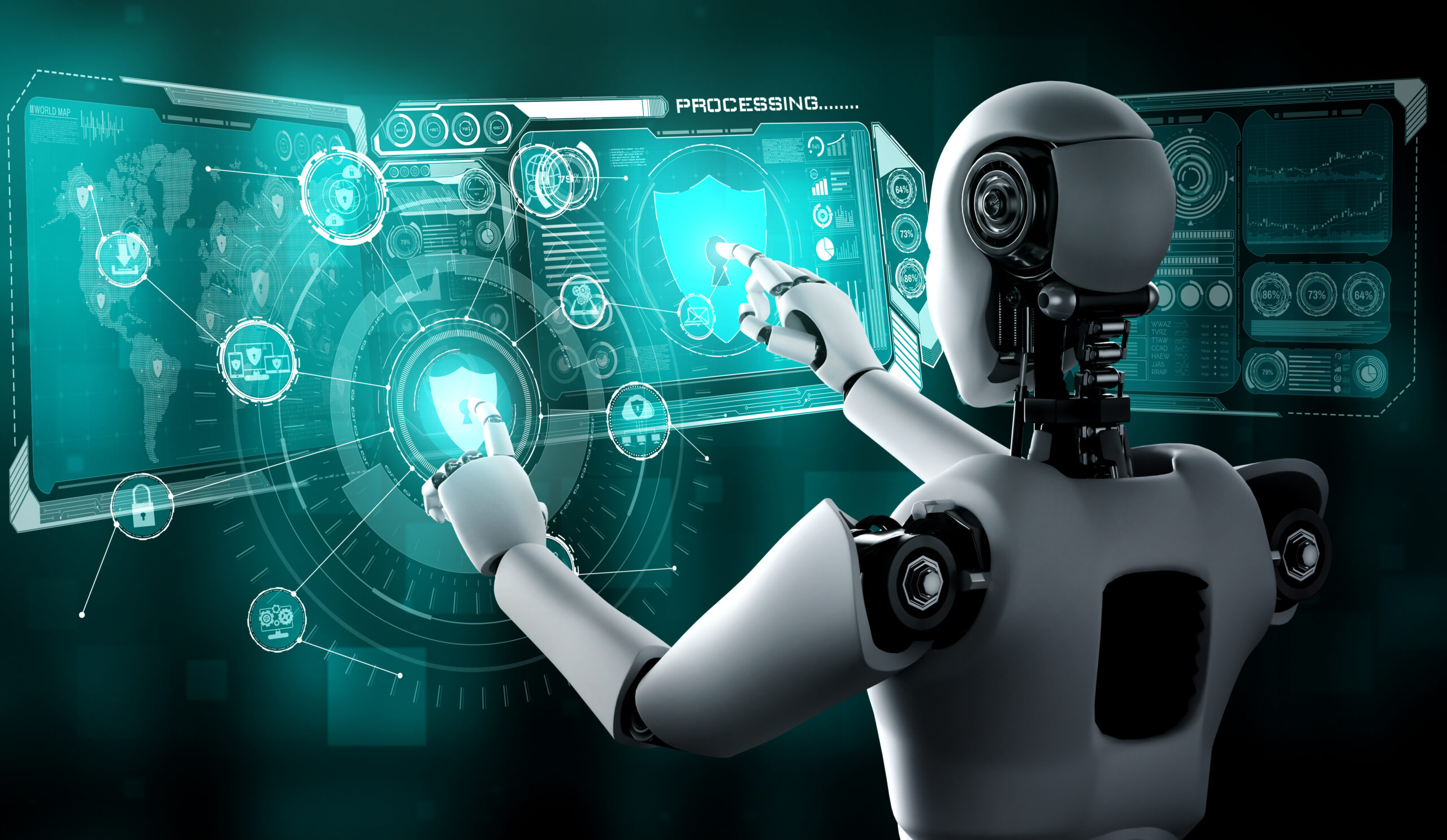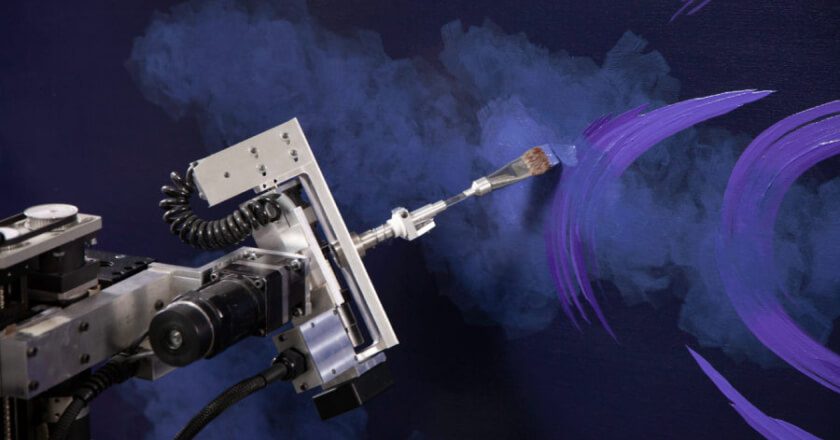Get Inspired
Build the life you love. Learn more about fusioneering:

Posted on November 17, 2023 in AI Technology
We’re in the midst of an artificial intelligence revolution — and painting masterpieces isn’t the only AI application shaking things up. In just the last few years, machine learning and AI technologies have come an extraordinarily long way, and the next decade promises to be an even more remarkable chapter in this continually evolving story. The influence of AI in our lives is becoming ever-present, touching almost every industry and aspect of daily existence. From healthcare to transportation, customer service to education, AI’s impact is profound and continually evolving.
What can we anticipate in the realm of AI over the next 10 years? Let’s take a look at the future of AI.
Read More: 5 Ways AI Has Already Changed Your Daily Life
As technology advances, so too do the cyber threats it faces. In the next decade, AI will play a vital role in bolstering cybersecurity. AI programs can analyze enormous datasets in real-time to identify patterns and anomalies that may signify a cyberattack, ensuring swift threat detection and proactive responses.
By learning from previous attacks, AI security can refine its defense mechanisms and anticipate new attack strategies, making it more difficult for cybercriminals to succeed. AI security systems can also automate incident response to a large extent, isolating compromised systems, containing threats, and reducing the burden on human security teams. This evolving technology will protect personal data, critical infrastructure, and financial institutions from cyberattacks, ensuring a safer digital landscape.
Related: 5 of the Most Influential AI from Fiction
AI is set to transform education by creating personalized learning experiences that more profoundly impact individual learners. Intelligent tutoring systems and adaptive learning platforms aim to provide real-time feedback and tailor instruction to specific student needs, offering customized curricula that adjust as students progress.
This doesn’t mean robots will be replacing teachers — rather, AI tools will aid the myriad teachers who are overworked or spread too thin to be effective. AI-driven grading and assessment tools will reduce the administrative burden on educators, freeing up more time for actual teaching. These assessment tools can also help identify areas where students are struggling and provide targeted interventions, improving overall learning outcomes and ensuring each student is given what they need to reach their full potential.
Teaching Tools for the Present: Ways to Incorporate STEM into the Classroom
Over the next 10 years, we can expect AI-driven predictive analytics to play an increasingly central role in healthcare. This technology will analyze individual patient data, such as genetic information, medical history, and lifestyle, to tailor treatments to each patient’s specific needs. Imagine receiving a prescription or treatment plan that’s uniquely suited to your genetic makeup, thereby improving efficacy and minimizing side effects.
AI-assisted medicine would assist in diagnosing diseases earlier, predicting patient outcomes more accurately, and identifying potential drug interactions. The increased use of AI-powered medical devices, such as wearable health monitors and remote diagnostic tools, would provide better healthcare accessibility and monitoring. Telemedicine, made more effective by AI, would also increase access to healthcare services, particularly in rural or underserved areas.
Sure, things like Siri, Alexa, and the Google Assistant don’t seem all that futuristic anymore — and their usefulness might seem like it’s on the downswing. However, as AI improves, we’re poised to see big leaps from the leading digital assistants. In the coming decade, these AI-driven virtual assistants will understand context and perform a wider range of tasks with greater ease and efficiency. Enhanced virtual assistants would answer questions, schedule appointments, make phone calls, draft emails, and facilitate more natural and dynamic conversations with users.
The integration of AI with natural language processing will go a long way in making these virtual assistants feel more human-like in their interactions. The advantages of these improved assistants are particularly valuable for individuals with disabilities and the elderly, who would benefit greatly from more accessible technology.
Beyond the Virtual: 4 Real-Life Robots that Assist Humanity
AI is becoming a critical tool in our fight against the climate crisis. Machine learning models can process vast amounts of environmental data, offering insights into climate patterns, extreme weather events, and long-term trends. This data can aid in the development of more effective climate mitigation and adaptation strategies.
On the other side of the fight, AI will be used to better optimize energy production and consumption. Smart grids would predict and manage energy demand efficiently, promoting the use of renewable energy sources. AI can also play a role in developing sustainable agriculture practices, ensuring food security in a changing climate. AI-driven early warning systems for natural disasters and extreme weather events would also help save lives and minimize damage, particularly in vulnerable regions.
When we look at the promise of the next 10 years, it’s clear that we’re on the cusp of a transformative era. The advancements in AI and machine learning technologies are poised to reshape our world in profound and positive ways, and these developments are not merely futuristic visions — they’re real-world innovations that are already well underway.
It’s essential to recognize that these AI-driven changes come with their own set of challenges, including: ethical considerations, data privacy concerns, and the need for responsible and fair AI deployment.
The responsible and ethical development and use of AI should remain at the forefront of discussions in the coming years. Embracing and leveraging our technological advancements responsibly will be the key to realizing the full potential of AI and ensuring a better future for all.
Ready to be part of the future of artificial intelligence discussion? Looking for ways to fusioneer your own future? Join the conversation and get inspired with the Kirby Foundation on our Instagram, Facebook, and Pinterest pages!
Are you interested in hearing the complete story of Paul and Dulcinea? Watch the video (nominated for Best Short Film at the 2021 Vail and Portland Film Festivals) for more info.
Want to be the first to know about every exciting new project at the Kirby Foundation?
Join Our Mailing ListBuild the life you love. Learn more about fusioneering:
Why pick which passion you should follow? Fusioneering allows you to cultivate many interests into something innovative and revolutionary.

Meet Paul and explore how blending your interests can empower you to follow your enthusiasm and bring your passions to life.